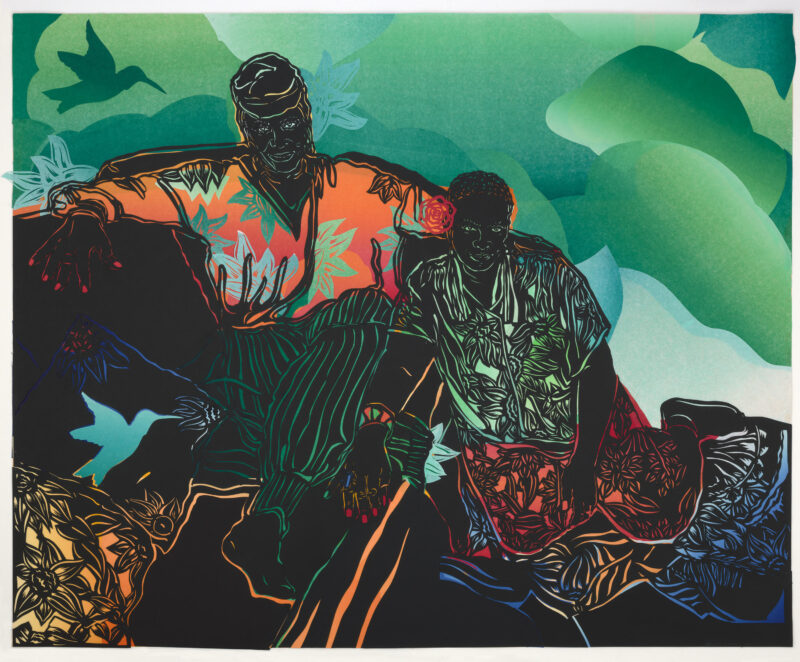In an interview this month, the visionary Ukrainian novelist Andrey Kurkov reflects on the uncanny proximity between absurdity and reality in his home country. Foreign readers often interpret the surrealism in his fiction as personal style, but, as he explains, the border between real and surreal, in Ukraine, lies somewhere different from where it does in other European societies. “Not everything that you find funny in the books is made up by me. It’s made up by my society, by my country, by my people, by the politicians, et cetera.”
An attunement to local modes of perceiving, particularly under conditions of war, inflects much of our June issue. In Alan Grostephan’s essay “Fragmentos,” the brutality of Colombia’s long civil war—officially over since 2016, but ongoing in other guises—is powerfully rendered through Doris Salcedo’s anti-monument to disarmed rifles, where historical memory is something you enter with your feet. In “The Hyphen’s Dream,” Fan Gao revisits the violence embedded in the Chinese-American hyphen and the fleeting sense of connection that the 2025 digital migration of millions of Americans to the Chinese app RedNote awakened in him. In “骨瓷 // Bone China,” meanwhile, our Global Spotlights piece, the Singaporean writer Ruru Hoong composes a grief ritual in memory of her grandfather, with ‘wander words’ of Mandarin gently drifting through her English prose. In “Mr. Rothlan,” an excerpt from Issa Quincy’s début novel Absence, a young man revisits the mysterious disappearance of a beloved teacher, unearthing an ugly truth long obscured by his own fractured memories. And finally, in “The Hindu House,” an excerpt from Raaza Jamshed’s début novel What Kept You?, a young girl in Pakistan steals an idol from her Hindu neighbors’ house, in a richly sensory tale that explores childhood transgression, secrecy, and the porousness between the sacred and profane.
We close the issue with the poems “Wind,” “Entrance,” and “Ileya” by Adedayo Agarau, whose bloody and polyphonic language, speckled with Yorùbá, viscerally conveys the grief of recent abductions and killings in Nigeria; as well as the translated poems “There are nights that escape,” “This is war,” and “Death’s night won’t come gently” by Irma Pineda, whose stark verses, drawn from Zapotec memory and resistance, speak to the toll of state violence against women and young girls.
Ultimately, Andrey Kurkov’s discussion with Alyssa Oursler on the real world’s translations into fictional modes leads him to a somber conclusion about the real world itself. His final comment on Ukraine’s uncertain fate and Trump’s lodestar being the desire to impress his might onto the world—“for this, some other country will be punished”—resonates especially chillingly this June as the US-aided genocide in Gaza carries onward in the form of engineered famine and killings at aid distribution points.
Featuring—courtesy of the artists—striking original art by Barbara Earl Thomas, Igbayilola Williams, Lapiztola, Li Chevalier, Olawale Ololade, Jianan Qian, and Fernando Olivera.
–Youmna M. Chamieh, Editor-in-chief
—
“Mr. Rothlan” –
A poignant narrative exploring memory, harm, and the complex echoes of the past. The narrator recounts a childhood, shaped by his mother’s readings of a particular poem, and then later, his reunion with his former teacher, Mr. Rothlan, who had mysteriously disappeared from school years earlier. “Mr Rothlan” is an excerpt from Issa Quincy’s debut novel Absence, published by Granta in the UK and Two Dollar Radio in the US.
—
“The Hindu House” –
In Raaza Jamshed’s “The Hindu House,” an act of childhood transgression leads to a series of events that challenge perceptions of reality and boundaries, exploring themes of memory, secrets, and the enduring power of a mysterious place.“The Hindu House” is an edited chapter from Jamshed’s forthcoming novel What Kept You?, to be published in Australia and New Zealand in July 2025.
—
“The Hyphen’s Dream” –
In this insightful essay, the writer Fan Gao ruminates about the hyphen and the way it colours his hyphenated identity as a Chinese-American. Revisiting the digital migration of millions of Americans to the Chinese app RedNote in the wake of a proposed TikTok ban, The Hyphen’s Dream looks back on the checkered history of US-China relations, and how, for a brief moment, social media offered him a spark of hope.
—
“Fragmentos” –
In this lyrical meditation on Doris Salcedo’s art piece “Fragmentos” and the war in Colombia, Alan Grostephan reflects beautifully on the nature of violence, memorialization, and the artist who “looks outward” to listen to–and honor–the stories of other people.
—
In “骨瓷 // Bone China,” our Global Spotlights piece, memory brews gently in the spaces between language and loss. Tracing a granddaughter’s grief for her Gong-gong through infusions of maté, oolong, jasmine, and white peony, and with ‘wander words’ from Mandarin drifting softly through its English prose, “骨瓷 // Bone China” invites us into something deeper than translation.
—
“Andrey Kurkov: “The Border Between Real and Surreal Lies Somewhere Else” –
The Ukrainian novelist on writing during war, using humor and magic to survive, and what’s next for his home country.
—
“Wind,” “Entrance,” “Ileya” –
Three poems that, in bloody and polyphonic language speckled with Yorùbá, viscerally convey the grief of recent abductions and killings in Nigeria. From Adedayo Agarau’s debut collection of poetry, The Years of Blood.
—
“There are nights that escape,” “This is war” and “Death’s night won’t come gently” –
Three poems that, drawn from Zapotec memory and resistance, speak to the toll of state violence against women and young girls. Translated from the Didxazá and Spanish by Wendy Call from the collection of poems Stolen Flower by Irma Pineda.

